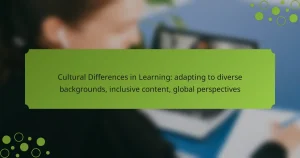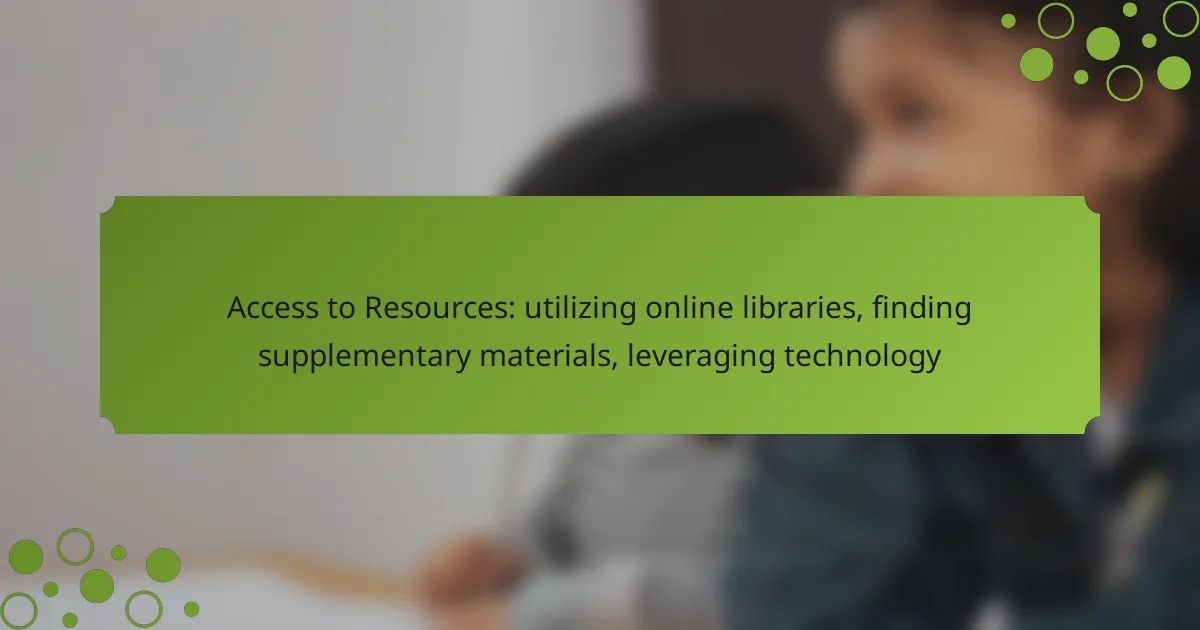
Access to resources has been revolutionized by online libraries, which offer extensive collections of academic materials and eBooks that can be accessed globally. This digital shift not only breaks down geographical barriers but also provides affordable options for individuals seeking information for research or personal development. Additionally, supplementary materials like open educational resources and platforms such as Khan Academy enrich learning experiences, enabling deeper engagement with content. Leveraging technology further enhances this access, allowing users to efficiently locate and utilize a wealth of educational resources from anywhere with an internet connection.
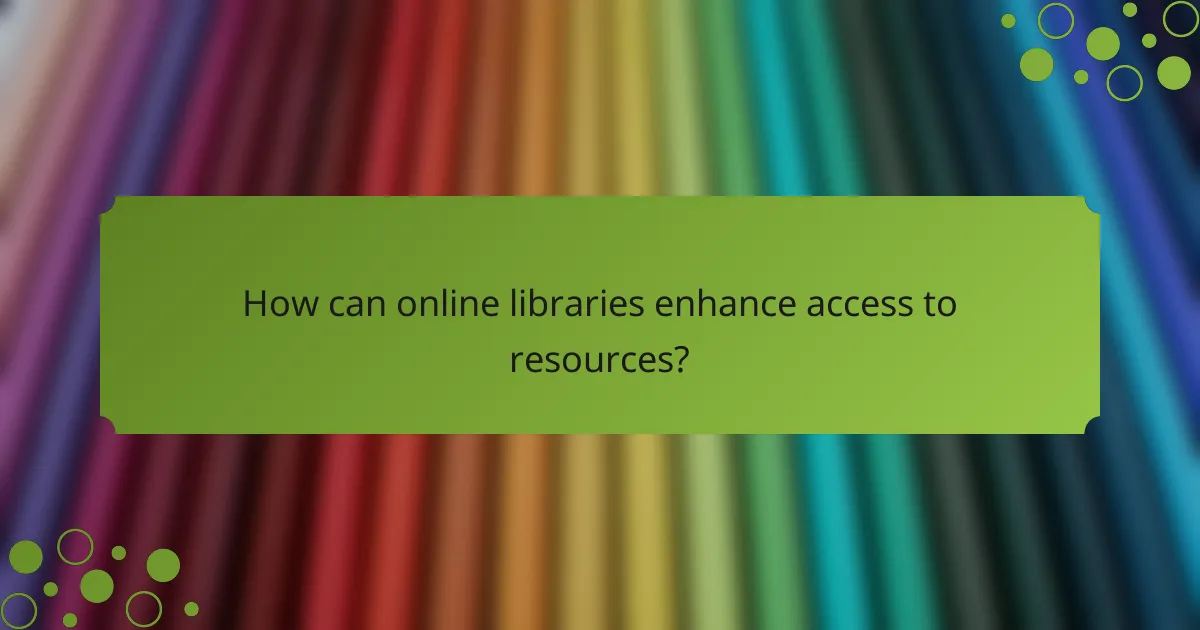
How can online libraries enhance access to resources?
Online libraries significantly improve access to resources by providing vast collections of academic materials, eBooks, and supplementary content that can be accessed from anywhere with an internet connection. They eliminate geographical barriers and often offer free or low-cost options, making it easier for individuals to find the information they need for research or personal growth.
Access to JSTOR for academic research
JSTOR is a digital library that offers access to thousands of academic journals, books, and primary sources. It is especially valuable for students and researchers in higher education, as it covers a wide range of disciplines including humanities, social sciences, and sciences.
To access JSTOR, users typically need to be affiliated with a participating institution, such as a university or library. Many institutions provide free access to their students and staff, while individual users can register for a limited number of free reads per month. Consider checking if your local library or educational institution has a subscription.
Utilizing Project Gutenberg for free eBooks
Project Gutenberg is a volunteer-driven initiative that offers over 60,000 free eBooks, primarily consisting of classic literature and historical texts. This platform is an excellent resource for anyone looking to read literary works without the cost of purchasing books.
Users can easily search for titles by author, title, or subject, and download them in various formats, including plain text, ePub, and Kindle. Since all materials are in the public domain, there are no copyright restrictions, making it a great option for educators and students alike. Always check the copyright status if you plan to use the materials for commercial purposes.
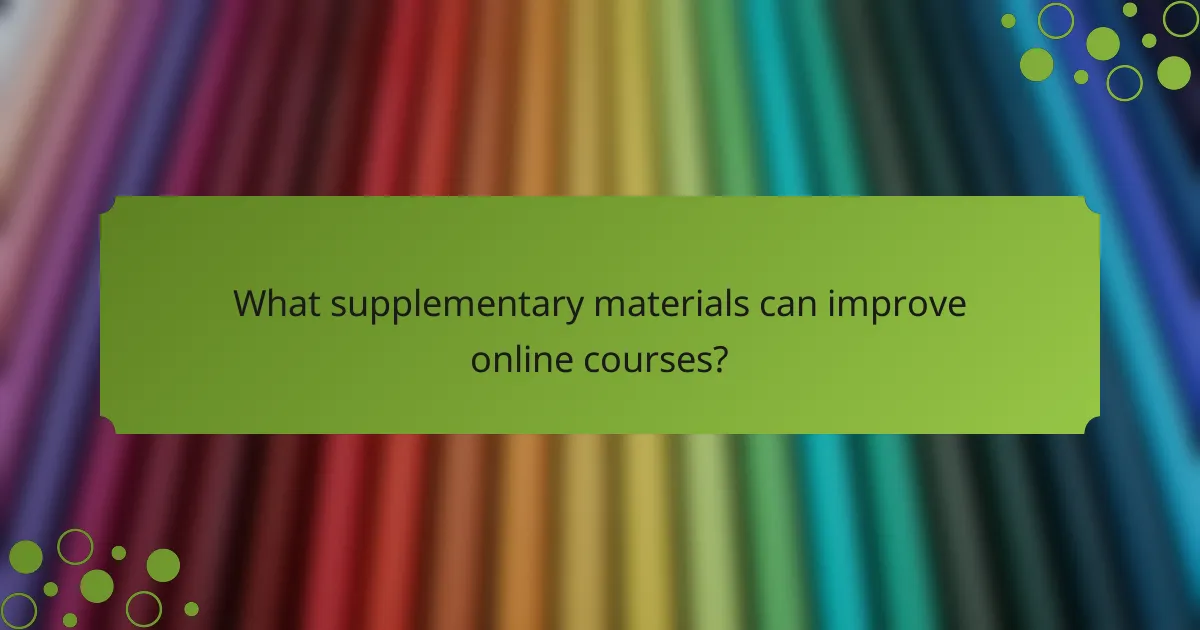
What supplementary materials can improve online courses?
Supplementary materials such as open educational resources (OER) and platforms like Khan Academy can significantly enhance online courses by providing additional content and diverse learning methods. These resources help students deepen their understanding and engage with the subject matter more effectively.
Finding open educational resources (OER)
Open educational resources (OER) are freely accessible, openly licensed materials that can be used for teaching, learning, and research. They include textbooks, course materials, and multimedia resources that educators can integrate into their online courses.
To find OER, start by visiting dedicated repositories such as OER Commons, MERLOT, or OpenStax. These platforms allow you to search for materials by subject, educational level, and type of resource, making it easier to locate content that fits your course needs.
When using OER, ensure that you check the licensing terms to confirm that you can adapt or share the materials. This can help you tailor resources to better fit your curriculum and enhance the learning experience for your students.
Using Khan Academy for additional learning
Khan Academy is a free online platform offering instructional videos, practice exercises, and a personalized learning dashboard. It covers a wide range of subjects, making it a valuable supplementary resource for students in online courses.
To leverage Khan Academy, encourage students to explore topics related to their course material. For instance, if a course covers algebra, students can use Khan Academy to access targeted lessons and practice problems that reinforce their understanding.
Additionally, instructors can assign specific Khan Academy exercises as homework or integrate them into their course assessments. This approach not only diversifies learning methods but also allows students to learn at their own pace, which can lead to better retention and comprehension of the material.
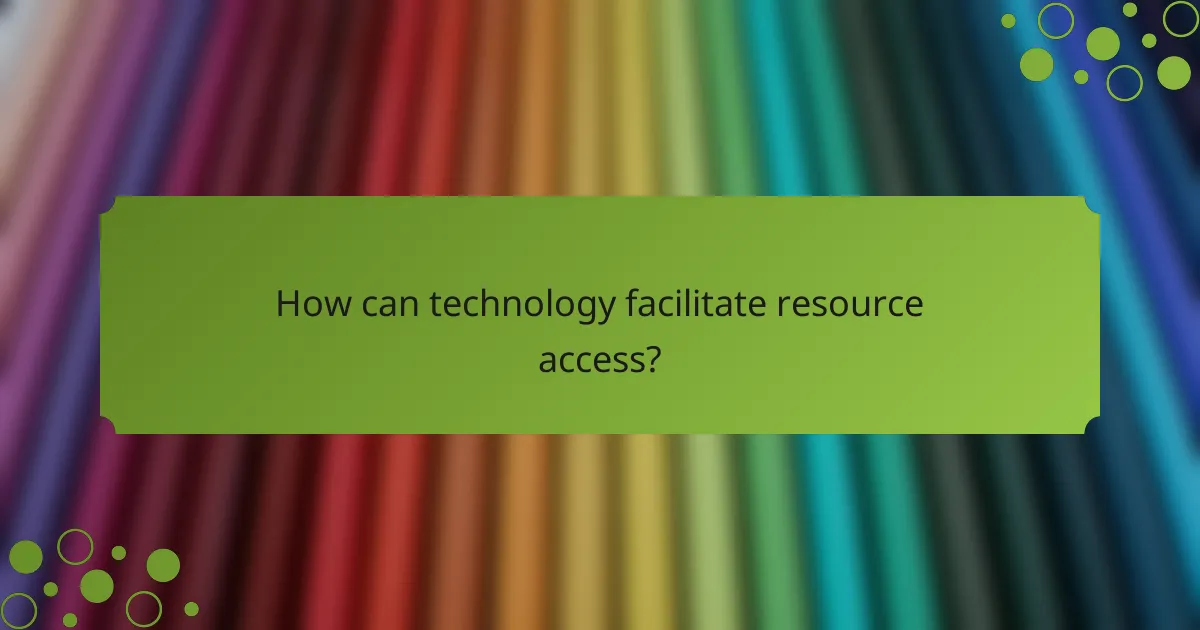
How can technology facilitate resource access?
Technology enhances access to resources by providing online platforms that connect users with vast libraries and supplementary materials. Through digital tools, individuals can easily locate, access, and utilize academic articles, books, and other educational resources from anywhere with internet connectivity.
Leveraging Google Scholar for research articles
Google Scholar is a powerful tool for finding research articles across various disciplines. By entering keywords or phrases related to your topic, you can access a wide range of scholarly articles, theses, and books, often available for free or through institutional access.
To maximize your use of Google Scholar, consider setting up alerts for specific topics or authors. This way, you receive notifications when new research is published, keeping you updated on the latest developments in your field.
Using mobile apps for library access
Many libraries offer mobile applications that enable users to access their resources remotely. These apps often allow you to browse catalogs, check out e-books, and reserve physical materials, making it convenient to utilize library services on the go.
When using library apps, ensure you have your library card information handy, as this is typically required for access. Additionally, explore features such as digital borrowing limits and due dates to manage your resources effectively.
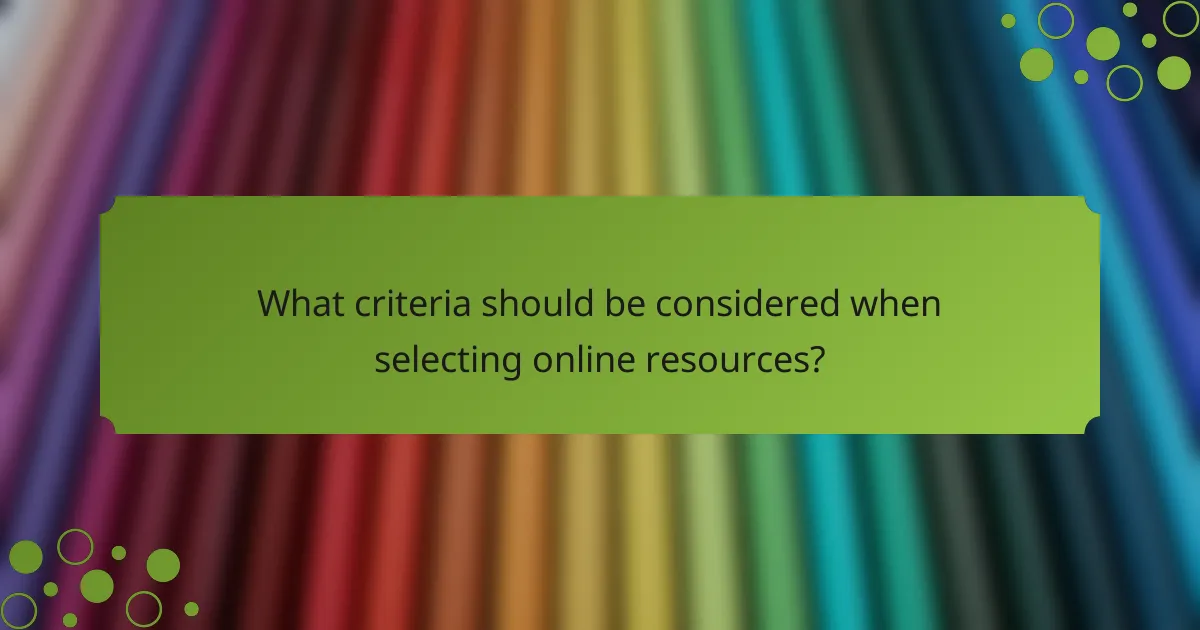
What criteria should be considered when selecting online resources?
When selecting online resources, consider credibility, relevance, and accessibility. These criteria ensure that the materials you choose are trustworthy, aligned with your educational goals, and easy to access for effective learning.
Evaluating credibility of sources
To evaluate the credibility of online sources, check the author’s qualifications, the publication date, and the domain of the website. Reliable sources often come from educational institutions (.edu), government sites (.gov), or established organizations.
Look for peer-reviewed articles and publications from reputable journals. A good practice is to cross-reference information with multiple sources to confirm accuracy and reliability.
Assessing relevance to course objectives
Assessing the relevance of resources to your course objectives involves aligning the content with your learning goals. Review the material to ensure it covers the necessary topics and provides depth that matches your curriculum requirements.
Consider using a checklist to evaluate relevance: Does the resource address specific concepts? Is it suitable for your level of study? Does it provide examples or case studies that enhance understanding? This approach helps in selecting the most beneficial materials for your educational needs.
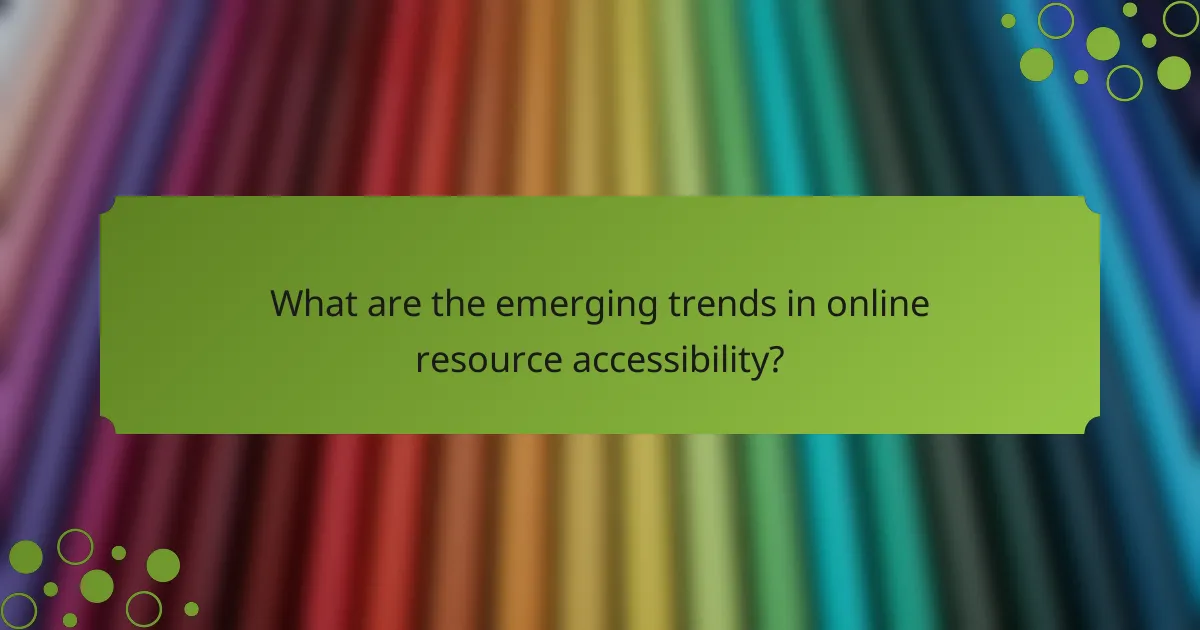
What are the emerging trends in online resource accessibility?
Emerging trends in online resource accessibility include the rapid expansion of digital libraries and the integration of artificial intelligence to enhance resource discovery. These developments are reshaping how users access educational materials and supplementary resources, making information more readily available and tailored to individual needs.
Growth of digital libraries in education
The growth of digital libraries in education has transformed how students and educators access learning materials. Many institutions are now offering extensive online collections that include e-books, academic journals, and multimedia resources, often free of charge or at a low cost.
Digital libraries provide flexibility, allowing users to access resources anytime and anywhere, which is particularly beneficial for remote learning. For example, platforms like Project Gutenberg and Google Books offer vast collections of literature and academic texts that can be accessed instantly.
Impact of AI on resource discovery
Artificial intelligence is significantly impacting resource discovery by personalizing the search experience and improving the relevance of results. AI algorithms analyze user behavior and preferences to recommend materials that best fit individual learning styles and needs.
For instance, AI-driven platforms can suggest supplementary resources based on a user’s previous searches or reading habits, streamlining the research process. However, users should remain aware of potential biases in AI recommendations and ensure they explore diverse sources for a well-rounded understanding of topics.
